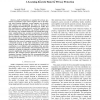Free Online Productivity Tools
i2Speak
i2Symbol
i2OCR
iTex2Img
iWeb2Print
iWeb2Shot
i2Type
iPdf2Split
iPdf2Merge
i2Bopomofo
i2Arabic
i2Style
i2Image
i2PDF
iLatex2Rtf
Sci2ools
CSFW
2011
IEEE
2011
IEEE
Regret Minimizing Audits: A Learning-Theoretic Basis for Privacy Protection
Abstract—Audit mechanisms are essential for privacy protection in permissive access control regimes, such as in hospitals where denying legitimate access requests can adversely affect patient care. Recognizing this need, we develop the first principled learning-theoretic foundation for audits. Our first contribution is a game-theoretic model that captures the interaction between the defender (e.g., hospital auditors) and the adversary (e.g., hospital employees). The model takes pragmatic considerations into account, in particular, the periodic nature of audits, a budget that constrains the number of actions that the defender can inspect, and a loss function that captures the economic impact of detected and missed violations on the organization. We assume that the adversary is worst-case as is standard in other areas of computer security. We also formulate a desirable property of the audit mechanism in this model based on the concept of regret in learning theory. Our second contribu...
| Added | 18 Dec 2011 |
| Updated | 18 Dec 2011 |
| Type | Journal |
| Year | 2011 |
| Where | CSFW |
| Authors | Jeremiah Blocki, Nicolas Christin, Anupam Datta, Arunesh Sinha |
Comments (0)

